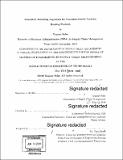Simulated annealing algorithm for customer-centric location routing problem
Author(s)
Sohn, Eugene
DownloadFull printable version (5.389Mb)
Other Contributors
Massachusetts Institute of Technology. Supply Chain Management Program.
Advisor
Mohammad Moshref-Javadi.
Terms of use
Metadata
Show full item recordAbstract
In today's world, the e-commerce market is growing rapidly and becoming more competitive. While many players in the industry are attempting to get their share of pie, consumers are demanding faster deliveries and free shipping. This market growth and change in consumer behavior provides an exciting opportunity for companies to compete. In order to meet the new consumer demand, companies need to find better ways to deliver faster. Faster delivery times can be achieved by using an optimization model to plan delivery network and operations. Typically, this optimization model has been based on minimizing cost. However, in the current market, lowest cost is not necessarily the best driver of sales as the consumer culture enters an era of instant gratification. We argue that minimizing customer waiting time will bring better performance and win over market share by providing the quickest delivery service that is expected by the majority of consumers. We propose solving the location routing problem (LRP) aiming at minimizing customer waiting time with capacitated depots and vehicles. We take two approaches to solve this problem: mathematical model and heuristic algorithm. The mathematical model obtains the optimal solution, but it has a limitation on the size of the problem due to the NP-hardness of the LRP. Therefore, we introduce three different variations of Simulated Annealing (SA) algorithm to solve the Capacitated Latency Location Routing Problem (CLLRP). According to the comparison results on a popular benchmark test, one of the designed SAs, the Iterative Simulated Annealing algorithm, consistently provides the best combination of performance and computation time compared to the other two SAs. Therefore, this specific algorithm is further compared to the mathematical model on some problem instances. The comparison results demonstrate that the proposed algorithm performs competitively with the algorithms in the literature and the mathematical model.
Description
Thesis: M. Eng. in Supply Chain Management, Massachusetts Institute of Technology, Supply Chain Management Program, 2018. Cataloged from PDF version of thesis. Includes bibliographical references (pages 36-38).
Date issued
2018Department
Massachusetts Institute of Technology. Supply Chain Management ProgramPublisher
Massachusetts Institute of Technology
Keywords
Supply Chain Management Program.